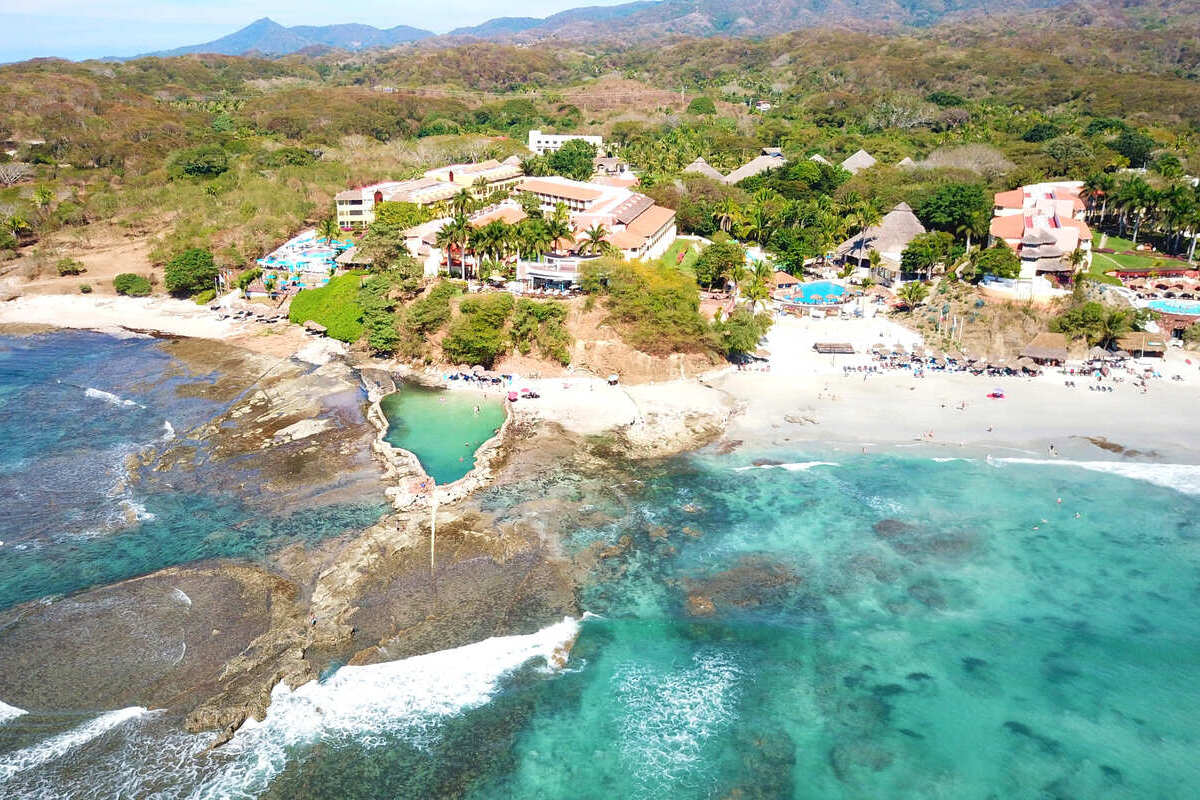[ad_1]
Last Updated
Being America’s number one tourist destination, Mexico attracts millions of sun-seekers and holidaymakers every year, usually headed to the Hotel Zone in Cancun or the resort-packed Baja California Sur, but while the powerful duo gets all the attention, other zones are often forgotten.

That is the case with the Riviera Nayarit, already an extremely popular resort on Mexico’s Pacific coast but one that never gets as much publicity despite boasting an equally high concentration of luxurious retreats and world-class amenities.
You may not have heard of it in a while, but the Riviera Nayarit is currently one of the fastest-growing destinations South of the border. This is why:
200 Miles Of Paradise

Though it is not as widely promoted as a destination like the Riviera Maya, the Riviera Nayarit extends for nearly 200 miles, lined by historical ports, development zones, and small fishing villages interspersed with sandy beaches and marine reserves.
A planned municipality a short half-hour drive from Puerto Vallarta, a city straddling the border between the states Jalisco and Nayarit, Nuevo Vallarta, or ‘New Vallarta’ is a resort town on the Bay of Banderas, home to renowned hospitality brands like Hilton, Velas, and Hard Rock.
Unlike Cancun or Playa Del Carmen, two of the Mexican Caribbean busiest spots, Nuevo Vallarta feels more like a gated community, full of luxury villas and palm-lined canals equipped with private docking piers.
It is somewhere you go if you’re not scared of splurging.

Punta de Mita has a similar environment, being the preferred destination of the ultra-wealthy and celebs jetting off to Mexico, but that’s not to say they are inaccessible to us, mere commoners: you can still find some pretty good vacation deals in the area, and rest assured you will feel like royalty.
This fall, the Grand Palladium Vallarta Resort & Spa, 2.1 km from Punta de Mita, has overnight rates starting at $232. A five-star all-inclusive paradise, it features an enclosed stretch of beach, leisure centers, and four outdoor pools, one of which is an infinity pool.
An Underrated Cultural Hotspot
Nayrait is not all about living it up by the seaside, either.

Beyond the shiny new hotel towers and shopping complexes, there is a whole coast of pristine beaches, secret coves, and traditional settlements awaiting rediscovery.
Bucerias is one of those small ports, with a name that literally translates as ‘Divers Town’. A typical Nayarit town, it is cut by cobblestone streets that lead to a main square, where visitors will find a landmark church and souvenir shops.
The town also straddles 18 miles of white-sand beach lapped by the azure Pacific, other than hosting the famous Altavista archaeological site, where over 2,000 rock carvings that are over 1,500 years old have been found, belonging to the native Tecoxquine people.

Sayulita is yet another bucolic spot, with a population of only 2,300 or so inhabitants and a growing presence of surfers, who are attracted to the tall waves. In recent years, digital nomads have also begun flocking into the area, drawn to its laid-back lifestyle and tropical atmosphere.
Traveling up Nayarit, tourists are also encouraged to stopover at La Cruz de Huanacaxtle, a fishing village on the Bay of Banderas only 15 miles from Puerto Vallarta, in the neighboring state of Jalisco.
It is easily recognized for the massive wooden cross fixed on the entrance.

Finally, there is San Blas, on the opposite end of the Riviera, 99 miles north of Nuevo Vallarta, commonly known as its ‘starting point’. Its Playa de Matanchen is notorious for having the longest surfable wave in the world, featured on the Guinness Book of World Records.
Is Nayarit Rising To Prominence Again?
With such a vast and diverse tourist offer, it’s no wonder the Riviera Nayarit is rising again in prominence, especially when five new hotels are set to be included in its portfolio.
As the Meridiano reports, state authorities are aiming high investing in the local tourism sector.

As the Secretary of Tourism Juiz Enrique Suárez del Real Tostado notes, however, new developments will follow the ‘European model’. This means tourists will only pay for their stay, minus the bottomless brunches and 24-hour catering.
The model may help keep the cost of accommodation down, as well as inject more money into the local community, as local businesses will have a chance to partake in the revenue distribution, as opposed to having resort brands simply hoarding cash from all-inclusive bookings.
In this situation, you can find restaurants, handicraft shops, and other businesses benefitting from the inflow of tourist dollars, unlike in Cancun or the wider Riviera Maya, where the all-inclusive model and luxury sector have led to controversial and irreversible gentrification.

The Meridiano informs that future tourists will not only generate an ‘economic spill’ for the hotels but also for ‘all sectors of society’.
Other than new hotels, the state is also injecting money into cultural spaces, especially after five towns were awarded the title of ‘Pueblo Magico’ in recent weeks: San Blas, Ahuacatlán, Amatlán de Cañas, Ixtlán del Río, and Puerto Balleto.
Read more about the Riviera Nayarit here.
Read More:
Top 5 Travel Insurance Plans Starting At $10 Per Week
How To Easily Earn Points For Free Travel
↓ Join Our Community ↓
The Out Of Town Blogs Community FB group has all the latest reopening news, conversations, and Q&A’s happening daily!

SUBSCRIBE TO OUR LATEST POSTS
Enter your email address to subscribe to Out Of Town Blogs’s latest breaking travel news, straight to your inbox.
This article originally appeared on outoftownblogs.com
Opinions expressed here are the author’s alone, not those of any bank, credit card issuer, hotel, airline, or other entity. This content has not been reviewed, approved or otherwise endorsed by any of the entities included within the post.
[ad_2]
